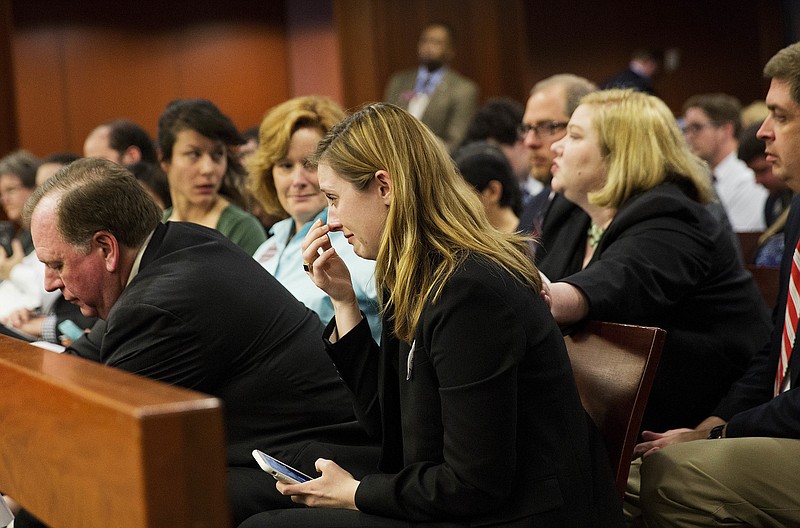ATLANTA (AP) - Advocates for victims on Tuesday asked Georgia lawmakers to reject a bill overhauling colleges' disciplinary processes in reports of sexual assault, warning that it could discourage victims from coming forward.
The Senate Judiciary subcommittee didn't take a vote after more than an hour of testimony, largely from victim advocates and women who identified themselves as victims of sexual assault asking senators to vote it down.
The bill's sponsor, Rep. Earl Ehrhart, said changes are necessary to protect the rights of accused students. Ehrhart argued that law enforcement is best suited to handle the cases instead of campus officials. He called campus disciplinary decisions a "scarlet letter" that can affect students' ability to get into another school or find work.
"That's a terrible thing to do to an individual," he said. "And that's happening on Georgia campuses."
Ehrhart, a Republican from Powder Springs, is a frequent critic of some Georgia schools' disciplinary proceedings, arguing that the rights of students accused of sexual assault have been violated. He also filed a federal lawsuit last year challenging a "Dear Colleague Letter" issued by the U.S. Department of Education's Office of Civil Rights in 2011 that laid out specific requirements for dealing with sexual violence under Title IX, a federal civil rights law that prohibits sex discrimination in education.
Republican Sen. Jesse Stone of Waynesboro on Tuesday offered some significant changes to the bill.
Schools could use a "trained administrator" to investigate violations of a student code of conduct but could not "obstruct" any criminal investigations. Schools could take steps in the meantime, including changes to housing assignments, issuing "no contact" orders and an interim suspension if "the accused poses a serious and immediate danger or threat."
Stone's maintained a requirement that school reports of felony crimes go to police. In sexual battery cases, the alleged victim's name would be kept confidential unless they chose to be identified.
Advocates said that will cause a "chilling effect" on reports of such crimes. Jessica Caldas, a graduate student in Atlanta, told the panel that she was raped while in college and decided not to report it to law enforcement. Caldas said people may have "numerous reasons" for deciding not to report, including fears of retaliation or a long criminal process.
"Victims know they will be questioned and challenged, that they may not be believed," Caldas said.
Another speaker questioned whether law enforcement will handle cases appropriately. Grace Starling, a law student at Georgia State University, has organized students against the proposal, citing her own experience with a campus disciplinary process and law enforcement after being raped while in college at another Georgia school.
Her father, Kenneth Starling, recalled police interviews that left his daughter in tears and told senators that a district attorney dropped the case after more than two years.
"You guys have all this confidence in law enforcement actually doing a better job," he said. "In my case, I don't believe that's true."
The Associated Press does not usually name people who say they are victims of sexual assault unless they come forward publicly as Caldas and Starling have.
Stone said he'll consider speakers' testimony and may bring changes back to the full Judiciary committee, which has meetings scheduled Wednesday and Thursday. Lawmakers plan to adjourn for the year on March 30.
